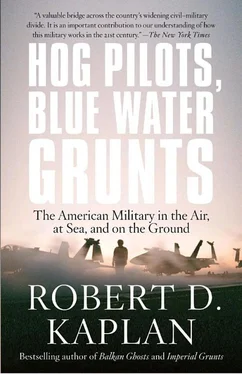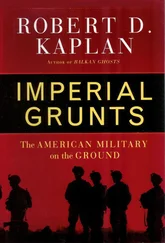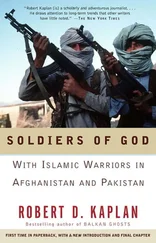———
Beyond Niamey, as I traveled north along the river, dark green scrub and tall millet fields competed with eroding layers of bright orange clay and dust. Niger was losing 7,800 square miles a year to desertification, though for the moment it wasn’t apparent because of the seasonal rains.
I was inside a white Toyota pickup driven by Maj. Paul Baker of Drummond, Oklahoma, the commanding officer of a platoon-sized Marine training team, which consisted of twenty-four men, including three Navy corpsmen, drawn from Camp Lejeune, North Carolina, and EUCOM’s Stuttgart headquarters. At forty years old, Maj. Baker, with wire-rimmed glasses, a graying-blond high-and-tight, and a frank, uncomplicated expression stamped on his face, was a bit long in the tooth for his rank. But so were some of his lieutenants, he told me, who had started out as enlisted men and later gone to Officer Candidate School at Quantico, Virginia. It would turn out to be a good platoon: the officers had been grunts (combat infantrymen) themselves.
Baker’s father had served twenty-eight years in the Army and the National Guard. His oldest brother had joined the Air Force, his middle brother the Navy. “So the only option for me was the Marines,” he said in a flat prairie accent. It wasn’t so simple. After graduating from Northwestern Oklahoma State University, Baker had tried farming. Then, in the slow burn of a job search during the Texas-Oklahoma oil bust of the 1980s, he called the local Marine recruiter. Months of back-and-forth brought news that he was unqualified to be an officer. So the next day he enlisted and was dispatched to Marine boot camp outside San Diego.
Baker rose to lance corporal and was eventually accepted at Officer Candidate School. This came after serving aboard the aircraft carrier USS Abraham Lincoln off Kuwait during the 1991 Gulf War, and evacuating refugees from the eruption of Mount Pinatubo in the Philippines soon afterward. Through a friend in the Navy he met “the wife,” a Vietnamese American whose father was a Vietnam veteran and a “Brown & Root type”—a private military contractor, that is. Baker was married at Camp Lejeune five days after returning from a deployment in Norway; his son would be born seventeen hours before he left for Okinawa on another deployment. He had no complaints. “I’ve been lucky in the Corps, and this,” he went on, looking out the truck window at the thorny African scrub, “is a great opportunity for a log officer.” For a logistics officer who had not made it to Afghanistan or Iraq, commanding a training mission in two African countries where the U.S. Marines had never been constituted the high point of Maj. Paul Baker’s career.
We had entered the Nigerien military base of Tondibiah where the marines had their hootch, or encampment. Even inside the base, there were millet fields and the occasional street urchin. “It’s a dramatic improvement over Chad, where whole villages existed within the army bases,” Baker noted. Having just finished a two-month training mission in Chad, and a week into one in Niger, Baker was struck by the stark differences between the two countries. On paper, Chad was marginally better off than Niger; moreover, because of three decades of civil war, Chad might have been expected to boast a flinty army. But the Marines had found Chad dirtier, less developed, and with a military in every way inferior to Niger’s.
In Niger only two or three men in each platoon required help to write their names; in Chad most did. Whereas the Chadian military manifested little rank structure and recruits often refused orders from their officers, Nigerien officers had real presence among their men, and even the noncommissioned officers showed initiative, which was rare for a third-world military. When the Marines had arrived in Chad, the host-country troops assumed an assault was jumping out of a truck and spraying fire from the hip. Baker was proud that at the end of the course they could execute a movement-to-contact with coordinated machine gun positions.
The Marine hootch was a one-story cement structure with a corrugated roof. It was protected only by concertina wire—the HESCO baskets had yet to be filled with sand. Compared to the high, sandbagged walls and paranoia I had experienced at U.S. Army Special Forces bases in Colombia, where car bombs and makeshift mortar attacks were a daily fact of life, the atmosphere here was laid-back. An American flag waved near a small barbecue grill. Mosquito nets covered the racks and big fat lizards climbed all over the walls and did push-ups in the dirt. I had my own sink, which delivered cold water, a luxury I had never before experienced with the American military. A fan whirred loudly. It was 110 degrees under a bleached iron sky. In the empty, echoing rooms I felt I was at a fleabag hotel. The vast array of weaponry and other military paraphernalia that dominated the Special Forces barracks I had seen in Latin America and Asia were absent. In comparison, the marines traveled stripped down, like backpackers.
They had just begun training three host-country platoons, composed of soldiers who had been individually selected for showing talent and motivation. Nothing fancy here. The initial training cycle consisted of the fundamentals of good soldiery: shooting, land navigation, and basic medicine. Liberty demands authority, for without minimal order there can be no freedom for anybody. If the civilian government was going to survive and protect its borders against transnational terrorists, military professionalization was key. It started with Baker’s marines.
———
I spent my first days at Tondibiah on the rifle range.
The instructors were Gunnery Sgt. Eric Coughlin of Shohola, Pennsylvania; Staff Sgt. Stephen Long of Irmo, South Carolina; Staff Sgt. Bobby Rivera of the Bronx, New York; and Sgt. Chris Singley of Milledgeville, Georgia. All were in their thirties except for twenty-five-year-old Sgt. Singley. I had been with marines long enough in Djibouti and Iraq to know that these four had to be an impressive bunch. The noncommissioned ranks were the heart and soul of the Marine Corps to a greater degree than the Army, for the United States Marines were among the most powered-down command structure of any Western military, in which battlefield expertise and leadership depended upon low-ranking sergeants leading even lower-ranking corporals, who in turn led lance corporals and privates. You didn’t get to be a sergeant of any kind without advanced training, particularly a staff sergeant who commanded a platoon of two or three dozen men, to say nothing of a gunnery sergeant. To wit, Gunny Eric Coughlin was a specialist in military mountaineering, Sgt. Chris Singley in riverine operations, and Staff Sgt. Steve Long a scout sniper and former PMI (primary marksmanship instructor) at Marine boot camp in Parris Island. As for Staff Sgt. Bobby Rivera, he was a member of Force Recon—the Marine equivalent of the Navy SEALs and the Army’s famed Delta Force. Rivera was on loan from the Special Operations Training Group at Camp Lejeune for this mission.
Because training third-world armies had for decades been an Army Special Forces’ affair, this deployment to Chad and Niger constituted a rare opportunity for the Marines to show what they could do. The Corps had sent its best.
It was dark and pouring when we set out for the rifle range at 6 a.m. The pickups halted at the Nigerien barracks to collect the trainees who would ride in the back. Listening to the beautiful singing of the African troops as they stood in formation before their commander, I began my acquaintance with Staff Sgt. Steve Long, a stocky, red-haired thirty-four-year-old with piercing eyes, whom Maj. Baker had tagged for me as one of the brightest marines in the unit. “He’s wasting himself doing what he’s doing—he should be in a much higher position.”
Читать дальше












